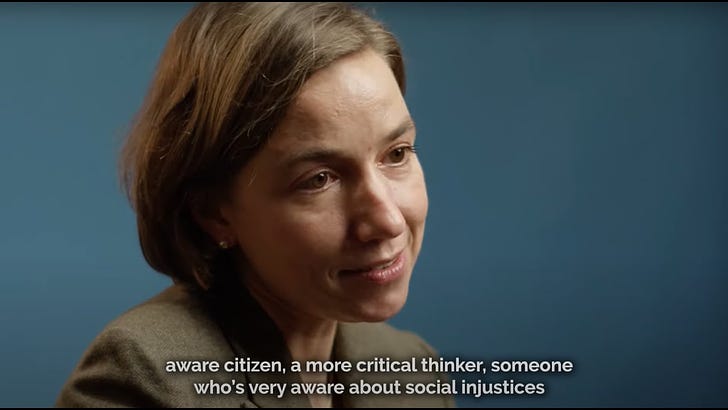There is something incredibly refreshing about the video below, which features high school history teacher Dr. Katharina Matro. Dr. Matro teaches sociology and history at Walter Johnson High School in Bethesda, Maryland. She also happens to be from Germany.
So much of what Dr. Matro discusses in this brief video resonates with the many conversations I have had with my German wife over the years. My wife talks with the same passion about our moral responsibility to confront the past here in the United States as she does about her own country.
This is not an empty gesture or simply another expectation that you are expected to give lip service to growing up in Germany. Dr. Matro offers compelling testimony about how a meaningful and honest engagement with the past shapes a broader moral framework, an appreciation of community and even a healthy sense of nationalism.
Let’s not lose sight of the fact that this is hard work that must begin at a young age and continue through adulthood. I feel this whenever I visit Germany. You see it not only at important commemorative and historic sites such as Dachau, outside Munich, which all German children are expected to visit, but also in the Stolperstein embedded in the sidewalks of major towns and cities.
I vividly remember my last visit to Frankfurt, walking along the Main River and coming across what you might call a pop-up exhibit of small yellow Jewish Stars of David hanging from the trees with the names of local victims of the Holocaust. No one intentionally avoided the exhibit. Some read the names while others read newspapers, played chess in the shade of the trees or shared a moment with a friend.
One of the things that struck me in the video is the ease with with Dr. Matro referenced her own family’s connection to the Holocaust. There was no hesitation or embarassment. I’ve experienced the same with my wife, who casually brings up her own family’s connection in conversations about this history, even with complete strangers.
When my wife first came to the United States to study music her father reminded her that she may meet Americans with a personal connection to the Holocaust and who may be less than friendly in her presence. My father-in-law reminded his daughter that she had an obligation to listen and not be disrespectful in response.
The ease with which Dr. Matro and my wife acknowledge their family’s past does not stem from a sense of personal guilt, but from a strong sense of collective shame. There is a difference. The former is born of an acceptance of a personal responsibility for an act. The latter reflects a recognition of one’s place in a community and an understanding that its identity and future depend on an honest recounting of its past and the acknowledgment that you are a part of that story.
I certainly don’t want to suggest that Germany has solved all the complicated challenges involved in coming to terms with dark periods such as the Holocaust and Nazi era. During the Cold War there were signficiant differences between how East and West Germans approached this issue. The popularity of the AFD Party suggests that not all Germans today embrace the same attitudes toward the past.
But with that said, it certainly offers a sharp contrast with the current debate in this country about how we teach the history of slavery and white supremacy and the continued difficulty of coming to terms with our shared past.
We need to learn not only how to confront our past, but also how live with our past.




I agree with Ty Seidule: "Telling the trugh is a ruthless act" and "I want more history, not less".
Back in 2005 I was in Europe on business, visiting several suppliers. One of the stops took me to Feucht, which is slightly south of Nuremberg. I had arranged to stay a couple of days in Nuremberg as I wanted to see the parade grounds where Hitler held his rallies. Not that far from the parade grounds (which at that time was in poor condition) was a museum about Nazism extolling the dangers and what it had wrought and so forth. I spent several hours there. It was excellent. There were numerous school groups there learning about its evils. That alone impressed me. Have you read the book “Learning from the Germans: Race and the Memory of Evil” by Susan Neiman. Worth a read.